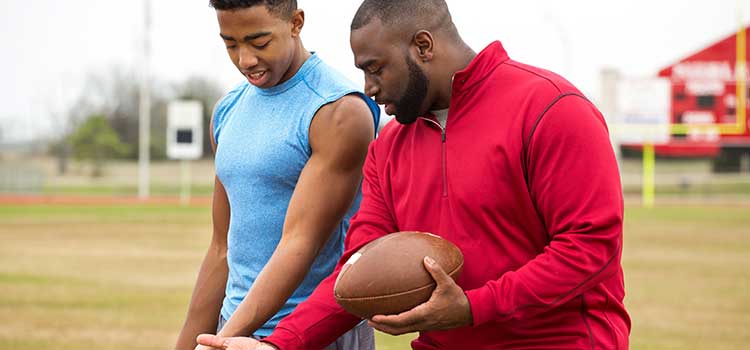In this Article
What Education Do I Need to Become a Sports Agent?

What is a Sports Agent?
Sports agents are professionals that represent athletes during contract negotiations and other financial matters. They further oversee clients' careers by promoting and managing their press image.
There's a lot riding on the job of a sports agent. Professional sports contracts can be worth millions of dollars. Opportunities such as bonuses and endorsement deals can increase those earnings even further. A sports agent helps manage those earnings and helps ensure young athletes aren't taken advantage of.
You'll need at least a bachelor's degree to get started in the field. If you want to work for the pros, you'll need go for a masters.
Steps to Becoming a Sports Agent
Becoming a sports agent can be very competitive. This career isn't as straightforward as simply getting a degree and then finding a job. There are some requirements that are unique to this field. You'll need to make connections, earn licensure, and more.
You can get started on your sports agent career before you even begin your education.
"I think the best way for an aspiring professional to prepare themselves for an opportunity in sports is simply to get involved at a young age in any way you can: volunteer, get an internship, coach a youth team, work for a sports organization or your college team/athletic department," says sports agent Carter Chow, who works with Yee and Dubin Sports, an agency that represents NFL, PGA, and other professional athletes.
While you're gaining experience, you can start down your career path.
Explore your options.

There are few different paths your career as sports agent can take. It's helpful to have a goal in mind before you start. That way, you'll know which steps are relevant to you. As you plan out your sports agent career, ask yourself questions such as:
• What sport am I most interested in?
• Do I want to work with student or professional athletes?
• Is there a part of the country I'd prefer to work in?
Earn your bachelor's degree.

A bachelor's degree is the foundation of your career as a sports agent. There's no one standard degree in this field, but it's a great idea to choose a sports management or business-related bachelor's degree. These degrees will offer courses on subjects that will be part of your daily job as a sports agent. Additionally, these degree paths are more likely to be able to help secure an internship or work placement than other bachelor's programs. A sports management or business degree from a school with a strong career counseling program can give you a major advantage.
Consider an internship.

An internship is a great way to start building your professional skills. It can give you experience working directly with athletes, and it can help you form the connections you'll need later in your sports agent career. Internships are available with sports agencies and athletic departments. These internships can be very competitive. It can help to have a very strong GPA from your bachelor's program and excellent recommendations from professors.
Earn your state license.

Sports agents need to be licensed in every state except Alaska, Maine, New Jersey, and Vermont. In all other states, you'll need to earn and keep licensure current to recruit, represent, and promote athletes. This applies to athletes starting at the college level. In some states it also applies to high school-age athletes in certain circumstances. Examples include teen athletes promoting a local business or being recruited for an all-star-level team.
The rules for sports agent licensure vary in each state that requires it, but there are a few common requirements. These include:
• An application that details your educational background and any work experience
• Thorough background check
• Credit check
• Licensure fee
Purchase professional insurance.

Some states will ask that you have professional insurance as a sports agent. The rules for this vary by state and might depend on whether you work with student or professional athletes. It's important to know the rules in your state before you begin working with athletes.
Consider an advanced degree path.

Many sports agents have an advanced degree such as a master's or doctorate. This isn't a requirement if you want to work with student athletes. However, if you have your sights set on working for any of the major leagues, you'll need an advanced degree. You can choose the degree path that makes the most sense for you and your sports agency career. Many agents earn Master of Business Administration (MBA) degrees or pursue law school to earn Juris Doctor (JD) degrees.
"The most common degrees for sports agents who work with professional athletes are JDs or MBAs," says Chow. "The National Football Players Association (NFLPA) requires anyone applying to be an NFL contract advisor to have an advanced degree. The NBA and MLB have similar certification rules."
Earn league certification.

Working for major league sports requires certification. Earning certification for the major leagues is more complex than the license you need to work in your state. The exact rules are different for each of the major leagues, but all of the leagues require that you:
• Take and pass an exam
• Earn at least a master's degree
• Pay a certification fee
• Pass a thorough background check
"Certification is supposed to ensure that an individual has the requisite knowledge and understanding to properly represent a professional athlete in contract negotiations with their team," explains Chow. "Once a person is certified by the NFLPA, they are authorized to speak to teams on the player's behalf. This also allows the union to regulate and monitor all agent activity when it comes to their role as a representative for the player."
Begin your job search.

Many sports agents work with agencies that represent multiple athletes. Agencies often specialize in a particular sport or type of athlete. You can find agencies that align with your background and career goals. Some sports agents also start their own businesses and work independently.
Network.

Making connections is vital for sports agents. You'll need to know other sports agents and people throughout the sports world. This can help you strengthen you own career and make better deals for the athletes you represent.
"The more experience you have and the more contacts you make the more marketable you will be," says Chow. "Experience and reputation are extremely important as you begin to develop a client base."
The more experience you have and the more contacts you make, the more marketable you will be.
Popular Sports Agent Degrees
Most sports agents start their careers by earning a bachelor's degree. It can help to earn your bachelor's in sports management, but you can get a degree in any related field. For instance, many business and finance-related degrees can also help start your sports agent career. Sports agents who want to work with professionals athletes will need to earn an advanced degree as their next step. There are three primary advanced degree options for sports agents.
What Classes Will I Take?
The classes you'll take will depend on the degree path you follow. For instance, you'll earn a full law degree if you pursue a JD. That means you'll take classes in subjects such as criminal law and family law in addition to business and contract law courses. Similarly, your MBA will include team leadership, business ethics, and economics courses in addition to marketing and communications courses.
Business Degree Classes
Law Degree Classes
Common Workplaces for Sports Agents
Sports agents typically work for agencies that represent athletes and coaches. Some agencies focus on professional athletes for certain leagues. Other agencies might focus on collegiate athletes, coaches, or athletes who compete in lesser-known sports. In addition to agencies, sports agents can find work with:
- Sports marketing agencies
- Talent agencies
- Independent offices
Duties and Responsibilities
Sports agents help ensure their clients are getting the compensation they deserve. Even professional athletes are often very young when they sign contracts and enter their professional careers. Sports agents can guide their clients through the contract signing process and can represent them during business and financial meetings. Sports contracts, promotional deals, and other negotiations can be very complex, and sports agents bring their educational background and professional expertise to the table.
Sports agents help ensure their clients are getting the compensation they deserve.
Of course, you won't be negotiating a new contract every day as a sports agent. There are also a variety of daily tasks you'll undertake. These tasks will depend on the type of athlete you represent and the agency you work for, but will often include:
A Day in the Life of a Sports Agent

It's not all press conferences and fast-paced deals for sports agents. You'll also have days filled with phone calls, data analysis, and reading the fine print.
"Being an agent isn't necessarily as glamorous as some people may think," Chow says. "There are definitely some exciting things we have access to, but a lot of my time is spent in my office on the phone or reviewing agreements and documents."
During your busiest times, you can expect long hours, weekend work, and even travel to be part of your job. You might need to fly to various locations to meet athletes, and you might need to work well outside standard business hours. Additionally, you might need to be on call to handle press questions and unexpected situations that occur.
Important Skills and Traits
It's no secret that sports agents need to be strong communicators with exceptional negotiation skills.
"Negotiation skills are important, but general people skills and the ability to communicate verbally and in writing are invaluable," Chow says.
You may also thrive in a sports agent career if you are:
Sports Agent Salary
Sports agents are generally well compensated for their hard work and professional expertise. The U.S. Bureau of Labor Statistics (BLS) doesn't track data for sports agents specifically, but it does classify sports agents among all other types agents. This category includes agents for actors, musicians, models, and artists. In 2023, the median salary for all agents was $84,900. The top 25% of agents earned over $129,930.
One thing to keep in mind is that these numbers can vary dramatically depending on the agency you work for and the type of athlete you represent. Sports agents often earn commissions on top of the annual salaries. Commission amounts are generally set percentages of the contract amounts of the athletes they represent. That means that agents who negotiate large contracts for their athletes will end up with higher personal earnings.
Sports Agent Job Outlook
Sports agent careers are competitive, but as long as sports themselves continue to be a driving industry, there will always be a demand for these professionals. Sports agents will continue to be the best people to take on the responsibility of representing players.
"I certainly think a good sports agent can enhance a professional athlete or coach's career," says Chow.
Stay Connected
Networking and connections are very important in for sports agents. One of the best ways to make connections is to join professional associations. Memberships allows you to meet fellow professionals, attend events, and stay on top of industry news.
Popular associations for sports agents include:
North American Society for Sports Management (NASSM): You'll find conferences, scholarships, and networking opportunities when you join NASSM.
National Sports Marketing Network (NSNN). NSNN offers career services, conferences, and local chapters to help you network.


